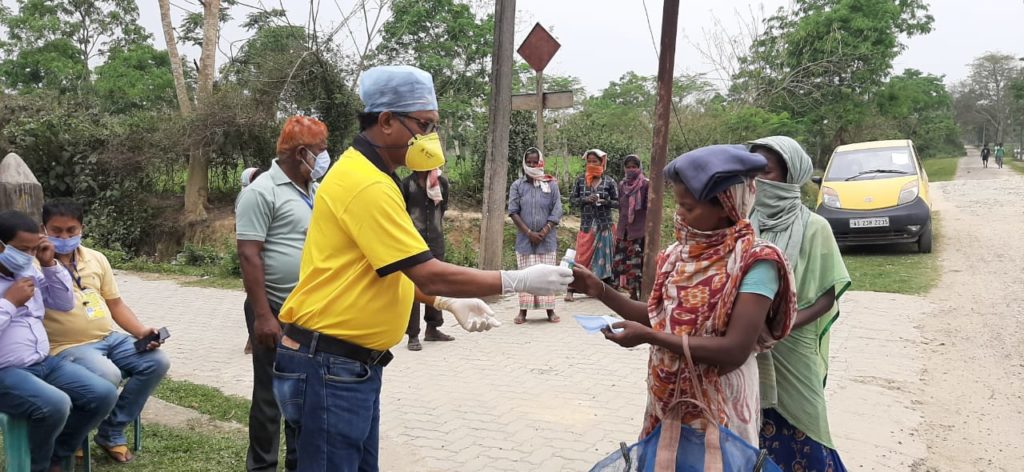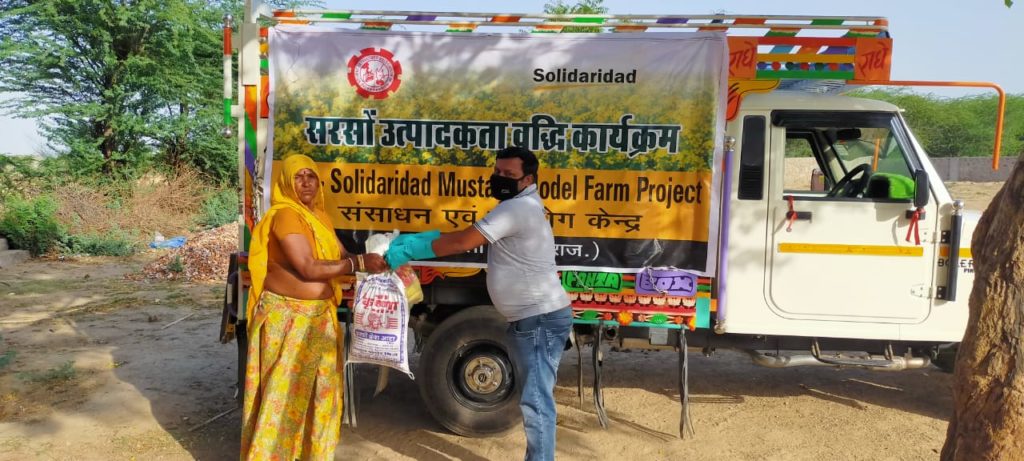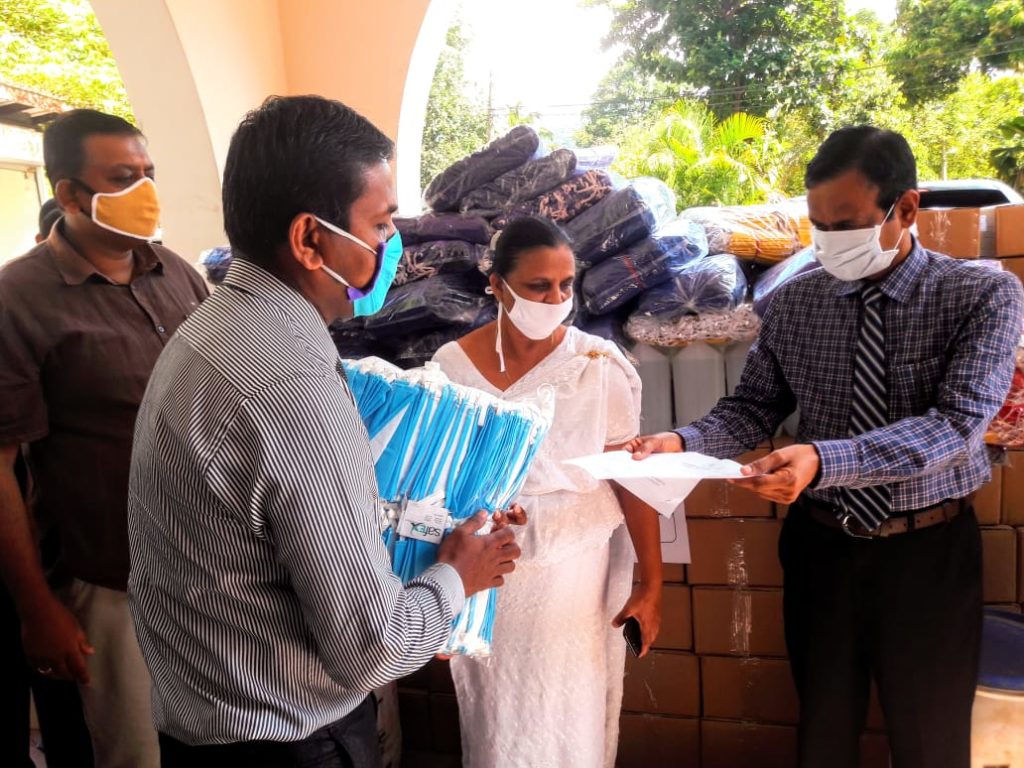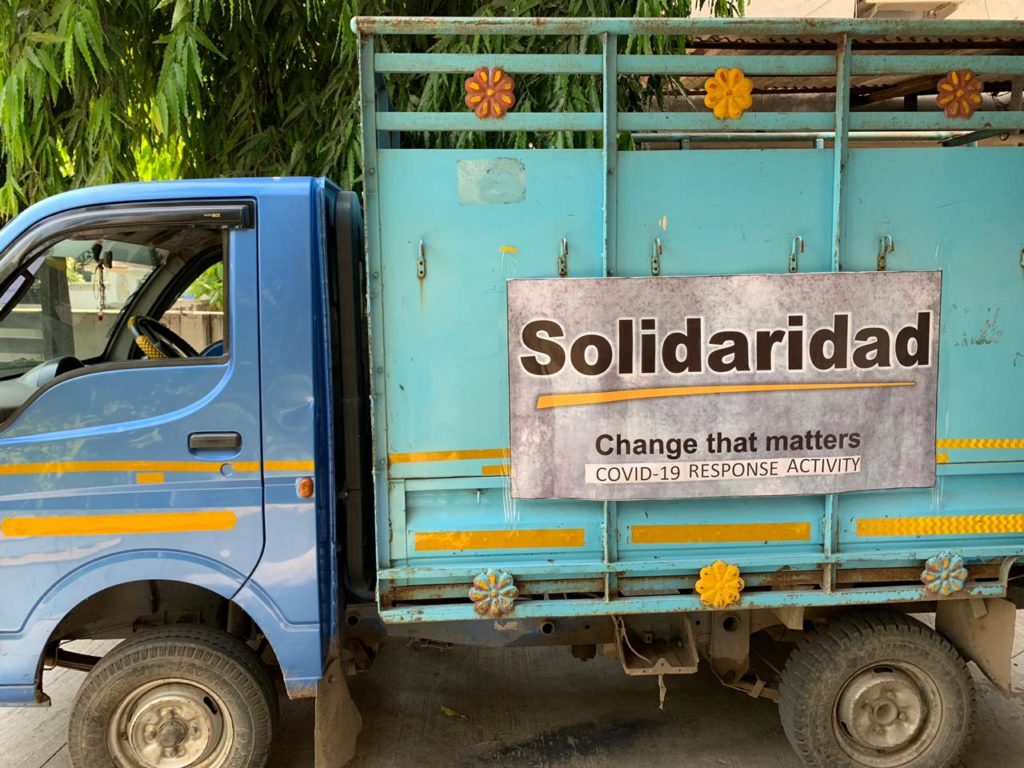
COVID-19 is wreaking havoc globally, with no immediate signs of retreat. While the entire world battles its spread, the hardest hit are low income and vulnerable communities. In rural parts of Asia, with little access to basic livelihood requisites during the lockdown, smallholders and daily-wage workers are grappling with a double crisis of income and health uncertainty. Living hand to mouth, these vulnerable communities cannot reasonably practice social distancing or lockdown, nor access needed protective gear..
Several healthcare and community volunteers are also increasingly falling prey to the virus without adequate protective measures. Shortage of personal protective equipment is proving fatal for the frontline workers, as the number of healthcare personnels testing positive for COVID-19 increases across Asia.
Relief Efforts
Recognising the pressing crisis at hand, Solidaridad has engaged in various relief and awareness mechanisms to abate the spread of COVID-19 in rural communities. Working closely with its partners and local authorities, Solidaridad has extended support to landless farmers, workers and vulnerable communities with basic livelihood requisites through supply of dry ration kits across Asia. The organisation has also provided personal protective equipment and preventive care provisions such as masks, gloves, soaps and sanitisers to several community workers and healthcare volunteers across different parts of rural Asia.
India

Relief efforts in India have been organised with support from the local administrations, following the Ministry of Home Affairs directives. Approximately 1,150 litre of sanitiser and more than 55,000 units of personal protective gear were distributed to healthcare officers and voluntary community workers across multiple districts in Andhra Pradesh, Assam, Orissa, Madhya Pradesh, Maharashtra, Rajasthan and Uttar Pradesh. Dry ration kits with basic sustenance and hygiene essentials such as rice, salt, sugar, flour, cooking oil, pulses, spices, soaps and bedsheets were distributed to the poor families and vulnerable communities in these regions.
Efforts to date include:
-
Over 2,000 oil palm farmers received relief materials and more than 2,600 frontline workers received personal protective equipment and sanitisers in Andhra Pradesh
-
10,000 kg of liquid chlorine along supplied for distribution across 96 panchayats (local village authorities) in Andhra Pradesh
-
10,000 farmers and daily wage workers received relief materials, including sanisters and masks, in Assam (with active assistance from Trinitea partners, ABSTGA and ITA.)
-
Around 3,000 smallholder farming families received relief materials under Trinitea programme in Assam
-
Over 2,500 migrant workers in Maharashtra supported with family-sized ration kits
-
1,000 grocery kits distributed to daily wage workers in Uttar Pradesh
-
40,000 units of personal protective equipment distributed to healthcare workers in Maharashtra and Uttar Pradesh
The areas covered so far include Elluru and three mandals (sub-districts) i.e. Chintalapudi, Kamavarapukota and Dwarika Tirumala of West Godavari district in Andhra Pradesh; Sonkatch block of Dewas district in Madhya Pradesh; Nainwa block of Bundi district in Rajasthan; Kanpur and Unnao in Uttar Pradesh; Nagpur and Yavatmal in Maharashtra; Tinsukia and Udalguri in Assam and Jagatsinghpur and Puri in Odisha. The relief programmes are also creating opportunity for promoting social and behavioural changes among the small farmers, so that they are better equipped to face the pandemic and its after effects.
Sri Lanka

In Sri Lanka, Solidaridad, along with its partners Institute of Social Development (ISD) and Nucleus Foundation (NF), provided basic safety and hygiene supplies to the local communities in the Matale and Nuwara Eliya districts and Badulla and Monaragala districts of Central and Uva provinces respectively.
Efforts include:
-
80,000 face masks, 60,000 units of bar soap, 5,000 kg of bleaching powder, 1,490 litres of hand sanitiser, and 4,000 litres of disinfectants distributed to tea workers, estates, and local service providers
-
10,700 families of estate workers reached with distributions
Bangladesh
In Bangladesh too, within the purview of its Sustainable Agriculture, Food Security and Linkages (SaFaL) programme, Solidaridad supported farming communities and volunteers with relief initiatives and worked towards creating awareness about maintaining hygiene and social distancing in the wake of the COVID-19 crisis, working in close coordination with the government and private stakeholders.
Efforts include:
-
4,800 farming households received sustenance support through food packages
-
2,300 households received rice seeds and fertilisers
-
Personal protective equipment distributed to field workers, traders, and farming households
-
Handwashing facilities established in all SaFaL business centers, collection centers, service centers and village super markets (VSMs)
Support and Encouragement

Solidaridad field staff have been essential in carrying out these COVID-19 response activities. While the availability and procurement of personal protective equipment was a formidable challenge initially in some areas, especially in India, support from local authorities to identify vendors filled the gap. There was a spirit of mutual support and appreciation between Solidaridad and partners including government actors.
Mr. Tatheer Zaidi, Regional Programme Head, Solidaridad Asia, said, “In Uttar Pradesh, the District Magistrates of both Kanpur and Unnao have appreciated our efforts along with the Principal of Ganesh Shankar Vidyarthi Memorial (GVSM) Medical College, Kanpur. The industry associations (UPLIA, STA, LIWA*) have also welcomed and highly acknowledged Solidaridad’s efforts at attempting to alleviate the plight of poor workers and families amidst the COVID-19 crisis.”
Farmers and community workers also expressed their gratitude to Solidaridad for supporting them during the crisis.
Distribution of masks and sanitisers by Trinitea has been very useful since we cannot go to the markets to purchase them” – Tea grower from Tinsukia District, Assam, India
“We appreciate the step taken by Trinitea to organise this workshop as many of the smallholders are living in poverty today. We, on behalf of our community in Doomdooma would like to thank Solidaridad, and hope that we are relieved of this pandemic soon,” said one of the small tea growers from Doomdooma, Tinsukia district in Assam, India.
Awareness Campaigns
Solidaridad has also been developing and disseminating several videos and reading materials (pamphlets) on COVID-19 prevention and safety measures for farmers and workers across its different programmes. For example, within the purview of the Trinitea programme, detailed videos and printed circulars on awareness about COVID-19 and the importance of social distancing to prevent its spread are being created and shared with small tea growers and workers in Assam and West Bengal. Similarly, illustrative documents and videos in multiple vernaculars have been developed for other programmes and commodities such as SaFaL, Code for Responsible Extraction (CORE), leather, cotton, palm, soybean, aquaculture and others. The organisation has also been using television, print and social media to create awareness about effective measures against the spread of coronavirus. In addition, Solidaridad conducted interactive Zoom sessions to support and create awareness among small farmers. For example, the organisation, along with its partners, engaged with small aquaculture farmers in Odisha, India, in an interactive online session to encourage them into building resilience through adoption of sustainable farming practices.
Need of the Hour
With the number of positive cases rising across metropolises worldwide, and developing countries like India struggling to keep up with the growing demand for protective gear and testing kits, the urban areas are already under pressure. Looking ahead, it will be critical to shield rural regions from the virulent spread and keep the region out of additional crisis. Protecting farmers and vulnerable communities is the need of the hour. Through its existing programmes and on-field staff and volunteers, Solidaridad will keep up the support in rural areas and continue to pursue persistent communication towards creating awareness and spreading positivity during these trying times.
*UPLIA – Uttar Pradesh Leather Industries Association, STA – Small Tanners Association, LIWA – Leather Industries Welfare Association
